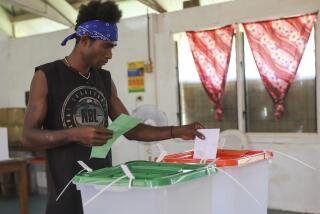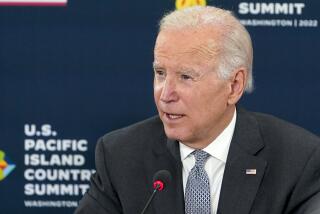U.S. Ends Its Governing Role in Pacific Lands
- Share via
SAIPAN, Northern Mariana Islands — The last U.S. high commissioner for the Trust Territory of the Pacific Islands on Wednesday formally marked the closing of U.S. management in much of the region with a 3,400-mile journey and a flag-lowering ceremony.
Janet J. McCoy flew first to Majuro, capital of the Marshall Islands, where President Amata Kabua called the end of the U.S. administration “a historic turning point in our political evolution.”
Later, at Kolonia, Pohnpei, capital of the Federated States of Micronesia, Vice President Hirosi Ismael said, “The closure of the trust territory government is possible because of our emergence as a sovereign state.”
The island governments were two of four political entities in the Pacific Islands trusteeship established in 1947 by the United Nations after World War II.
In 1983 plebiscites, they voted to become freely associated states with the United States. The nearly 125,000 residents will receive about $2.4 billion in U.S. economic aid over a 15-year period.
Receives Commendation
At each of the ceremonies, Adm. Ronald J. Hays, commander in chief of U.S. military forces in the Pacific, presented McCoy with the Department of Defense Distinguished Public Service Medal for “development and expansion of United States national strategy within the trust territories.”
He read a letter from Defense Secretary Caspar W. Weinberger calling closure of the high commissioner’s office “a historic time” and McCoy’s work “a national achievement.”
McCoy was appointed by President Reagan in December, 1981. The high commissioner’s office will officially close July 10, and McCoy said she plans to retire to Scottsburg, Ore.
McCoy told her audiences that she is “sad because of leaving my many friends in Micronesia, but happy because of their new forms of government.”
Lowers Flag at Saipan
She ended the 13-hour day by lowering the high commissioner’s flag at her Saipan headquarters.
In addition to the Marshall Islands and the Federated States of Micronesia, a third political entity in the trust territory, the Northern Mariana Islands, will become a U.S. commonwealth.
Palau remains a trusteeship because its residents have been unable to give a 75% approval to a proposed Compact of Free Association. Residents voted Tuesday on whether to accept a new political status, but early returns indicated the required 75% voter approval would not be met.
The Interior Department has administrative responsibility for Palau until its future is decided.
The United States also retains defense responsibilities for the vast region, which covers about 3 million square miles of the Pacific.
More to Read
Sign up for Essential California
The most important California stories and recommendations in your inbox every morning.
You may occasionally receive promotional content from the Los Angeles Times.












